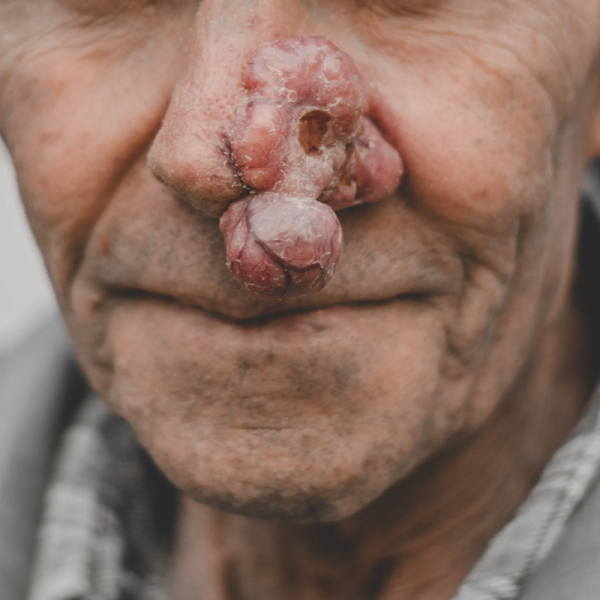
What is nasal cancer?
Nasal cancer describes a malignant tumour in the nose or sinuses. The tumour grows inside the nose, i.e. in the nasopharynx. In most cases, nasal cancer is a so-called adenocarcinoma, which develops from a gland-like tissue. While nasal cancer is rather rare in Europe, the disease is more widespread in Asia. With one percent of all malignant tumours of the nose, the cancer really does not occur very often in this country. Tumours in the head and neck area are more common, accounting for almost twelve per cent. Men over the age of 50 are affected by nasal tumours about twice as often as women. The probability of developing nasal cancer increases with age.
How does nasal cancer develop?
Nasal cancer usually forms in the area of the nasal cavity and the paranasal sinus and penetrates into the maxillary sinuses. In other cases, nasal cancer can also form on the outside of the nose and is often caused by intense UV radiation. Doctors also refer to this as black skin cancer, melanomas of the skin, which are not classically associated with nasal cancer.
Classic nasal cancer refers to tumours that grow inside the nose. It usually forms from the so-called nasal epithelial cells, which start to grow uncontrollably. However, the growth is rather slow and can take decades in some patients.
What causes nasal cancer?
The exact causes of nasal cancer are still unclear. However, doctors have been able to identify some risk factors that could play a role in the development of nasal cancer. These include, for example, inhaling wood dust, which is why carpenters in particular are at increased risk of the disease. However, genetic predisposition can also play a decisive role in the development of nasal cancer. Relatives of a person suffering from nasal cancer are more likely than average to develop the same disease. Viruses such as the Epstein-Barr virus or the human papillomavirus (HPV) can also promote nasal cancer. As with other cancers, excessive smoking or alcohol consumption can also play a role in the development of nasal cancer.
How does nasal cancer manifest itself?
The first symptoms of nasal cancer are similar to those of a cold or flu. As with these two illnesses, the nose is blocked (often only on one side) and those affected complain of a diminished sense of smell. In addition, there may be increased mucus production, which runs either from the nose or from the throat. In addition, the nose tends to bleed more often.
The symptoms already described often occur with nasal cancer in the paranasal sinus. However, if the tumour is in an advanced stage, the following symptoms may also occur:
- Pain in the face, especially in the upper cheek area,
- swelling of the lymph nodes in the neck,
- diminishing vision or double vision,
- watery eyes,
- Pressure sensation or pain in the ear (often only noticeable on one side)
How is nasal cancer diagnosed?
If you suspect that you have nasal cancer, you should go directly to a specialist. After taking a medical history, he or she will carry out a detailed examination to determine whether it is actually a tumour. By using the usual imaging methods, such as magnetic resonance imaging (MRI) or computer tomography (CT), it can be determined exactly where the tumour is located and how far it has already spread.
To make a definite diagnosis, the doctor will perform a biopsy, in which a tissue sample is taken to be examined in the laboratory by a pathologist. This can determine what type of tumour it is, i.e. whether it is benign or malignant.
How is nasal cancer treated?
The type of treatment depends on several factors, such as the exact location of the tumour and the stage of the cancer. If the tumour is in the nose, surgery is usually possible. Tumours that are located in the nasopharynx, on the other hand, cannot be removed so easily by surgery. In this case, it makes sense to have radiotherapy to shrink the tumour and make surgery easier. Depending on the case, doctors may also recommend chemotherapy in addition to radiotherapy.
If the natural appearance of the nose is affected by surgery, it can be reconstructed by plastic surgery. It is also possible to make an artificial nose out of plastic, called an epithesis.
What is the prognosis for nose cancer?
As with other cancers, the earlier the disease is treated and diagnosed, the better the chances of cure. Statistics from the USA show that the 5-year survival probability for nasal cancer is about 65 percent if the tumour is diagnosed at an early stage. If it is an advanced tumour at the time of diagnosis, the chance of cure drops to 35 percent.
If it is a tumour in the nasopharynx that is diagnosed early, the prognosis is about 70 percent. If it is diagnosed later, the chances of cure drop to about 40 per cent. Generally speaking, the prognosis for nasal cancer is worse if the tumour has already grown into the sinuses or the eye sockets. The prognosis is also worse if the tumour has already metastasised.
Which specialists deal with nasal cancer?
Nasal cancer is treated by doctors specialising in ENT surgery, but also in neurosurgery. In addition, radiation and chemotherapy are carried out by oncologists as well as experts in radiology.
